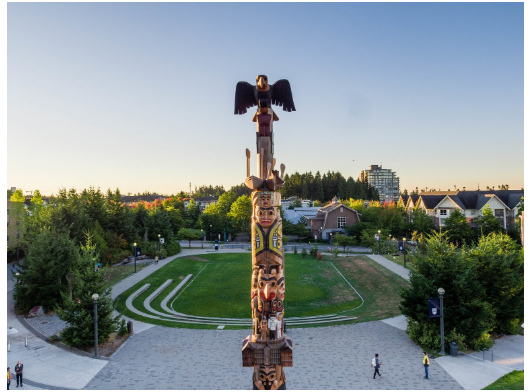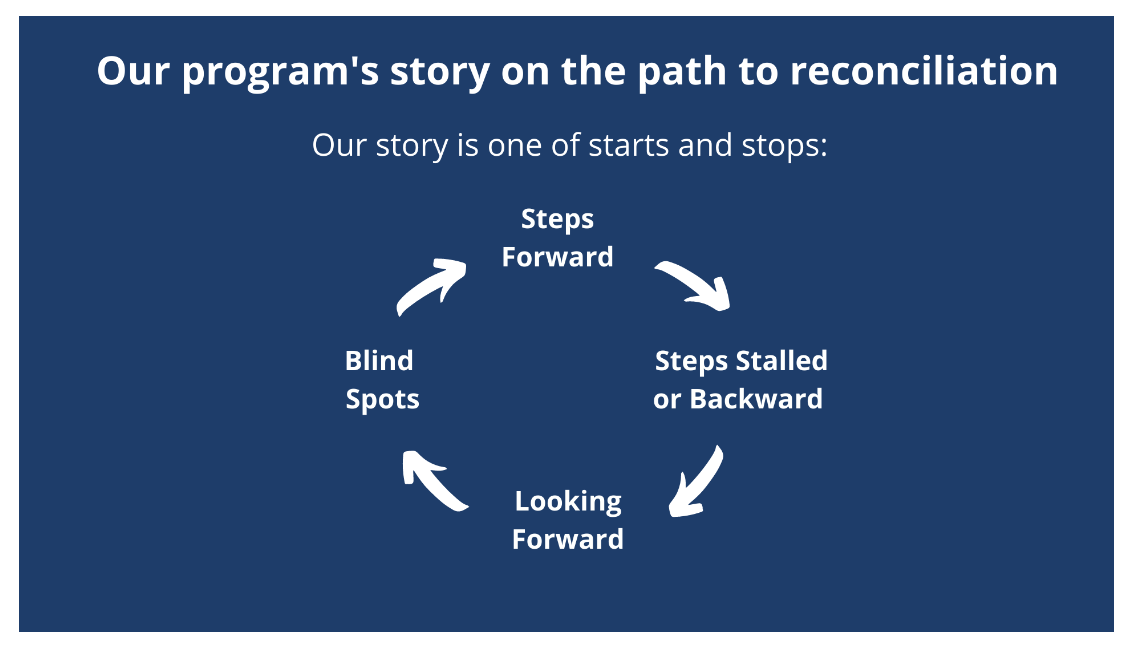
We acknowledge that the UBC Vancouver campus is situated on the traditional, ancestral, and unceded territory of the xʷməθkʷəy̓əm (Musqueam).
Truth and Reconciliation
Truth and Reconciliation

We recognize that public health is implicated in the harmful legacy of colonization.
We know that our scholarly profession, our School and our educational programs have responsibilities to promote Truth and Reconciliation.
We realize that we have been, and remain, far from perfect in fulfilling those responsibilities.
Indigenous Applicants are Very Welcome and Encouraged to Apply
Truth and Reconciliation is a key theme that frames our thinking about the Master of Public Health Program. As part of our commitment to reconciliation, we aim to eliminate barriers to entry into the program for Indigenous applicants. We warmly invite all Indigenous applicants who are interested in joining our program to apply. We welcome and encourage you, and we will do our best to support you throughout the application process and beyond. Please find information about funding available to Indigenous students below:
Starting with our recruitment for the 2022 cohort, 50% of the funding for the Master of Public Health (MPH) program (approximately $15,000) is now reserved specifically for Indigenous students:
- We offer approximately $10,000 to a top Indigenous student to cover her/his/their two years of tuition.
- Approximately $5,000 will be allocated to a second Indigenous student to cover the first year of tuition.
Of note, when Musqueam applicants are accepted into the MPH program, the $10,000 scholarship will be allocated to the top applicant in recognition of the unique responsibilities that the SPPH has to advance reconciliation with the Nation on whose traditional, unceded, ancestral land our institution is located.
Many thanks to our colleagues Patricia Spittal and Melanie Rivers for helping our MPH program come to emphasize the specific obligations we have to advance reconciliation with the Musqueam Nation.
Recruitment
For each new cohort that we recruit, we aim to make room for at least 10% of new students to be Indigenous.
Our Application Process
Our application materials invite all candidates to consider the following as they pen their letter of intent: “SPPH values and seeks to recruit Indigenous students as well as students with diverse racial, ethnic, gender, socioeconomic, sexual orientation, ability/disability, and religious contexts. Our admissions processes and committees take into account equity, diversity and inclusion in criteria development, the assessment of merit relative to these criteria and the student community across our graduate programs. Applicants are welcome to include any equity, diversity and inclusion considerations within the letter of intent or within any of the other supporting documentation.”
The MPH Program on the Path to Truth and Reconciliation
Our path to reconciliation is a story of starts and stops. There have been steps forward, backwards, and sideways. We have blind spots, for which we are constantly on the lookout, but don’t always see. (See the image below).

Below are our reflections on how these forwards, backwards and sideways steps toward reconciliation.
Our Steps Forward
1) Curriculum Revisions
We are proud that we were (among) the first MPH programs in Canada to revise our curriculum to require all students to take a full course to learn about:
- The harmful legacy of colonization.
- Its ongoing influence on population health.
- And our collective responsibility to serve as agents of change to disrupt the unearned advantages and disadvantages imposed by our social, political, economic and health systems.
- Learning and responding to these themes is now considered a core competency of our MPH training.
2) Indigenous Student Support and Leadership
- Each year, the MPH program hires ~3 student leaders to participate in our Program’s leadership team.
- We reserve one of these spots for an Indigenous student to ensure Indigenous leadership on our team, and to provide Indigenous students with opportunities to disrupt power dynamics in our School and profession.
- Opportunities to disrupt are real. For example, one Indigenous Student Leader identified a major shortcoming in the School’s Strategic Plan, which led to subsequent improvements to the Plan. Others are contributing recommendations to Indigenize the culture and community practices at our School of Population and Public Health.
3) We intentionally foster connection and community among our Indigenous students.
- We allocate program resources specifically to build a practice of Indigenous peer mentoring and resilience as a partial strategy to redress the reality that we know our School is not always experienced as a culturally safe environment for First Nations, Inuit and Metis colleagues.
4) Recruitment
- For each new cohort of students that we recruit, we aim for at least 10% of new students to be Indigenous.
Most Indigenous students earn entry into our program because of their high academic standing in previous educational settings.
5) Unlearning
- With support from the Program, our students have initiated an innovative Unlearning Club that supports students (especially non-Indigenous students) to reflect on systems of oppression, and the unearned advantages these systems convey to some, along with unearned threats they convey to others. Students have adapted an innovative Unlearning Model started in the office of BC’s Chief Public Health Officer.
Our Steps Stalled or Backward
1) Curriculum
- As we changed our curriculum to require all MPH students to study the harmful legacy of colonization for public health, we didn’t initially anticipate that Indigenous students may regret losing access to a course that explored decolonization in depth in order to welcome many students with limited knowledge about the history of colonization to learn some basics.
- In response, we have reserved seats for MPH students in an introductory course about Indigenous public health.
2) Representation in Leadership
- Our initial effort to reserve a leadership spot for an Indigenous student was not communicated by the program adequately.
- This led some students to question whether the selected student leader “represented” them.
- While a charitable interpretation recognizes that many students who asked this question did so because they were concerned they didn’t have a chance to “elect” the leaders, it nevertheless was heard by the Indigenous student as another example of his being told he is “an outsider” or “not good enough.”
- We have changed the communication about the role to prevent (or at least reduce the risk) that this problem could emerge again.
3) Unlearning Club
- The Students are demonstrating a lot of responsibility to accelerate their “unlearning” of white supremacy, colonial attitudes, and more. Now they are asking whether our faculty are sharing enough responsibility for actively unlearning as well.
- The MPH program originally provided financial support for leadership of the Unlearning Club by allocating paid time from Student Facilitators we hired to be on our MPH leadership team. We didn’t anticipate that Students would judge they didn’t think it was optimal for the Program Director to have the ultimate say in which students received payment to lead the Unlearning Club. In response, we have since changed how financial resources are made available to support student leadership of the Unlearning Club.
Blind Spots
- Beyond the steps identified above, there is more work ahead for our Program to advance reconciliation.
- Some of that thinking is underway. Some of that thinking is not.
- We acknowledge ongoing blind spots created by systemic power dynamics that reinforce the status quo, along with the obligation to urgently overcome those blinds spots in order to take the requisite actions to decolonize our Program and practices.